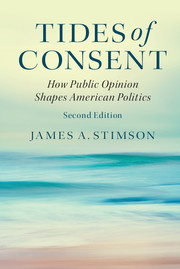Book contents
- Frontmatter
- Contents
- List of Figures
- List of Tables
- Preface to the Second Edition
- Preface to the First Edition: The Shutdown
- Acknowledgments
- 1 Opinion Flows
- 2 What the Public Wants of Government
- 3 Left and Right Movements in Preference
- 4 The Great Horse Race: Finding Meaning in Presidential Campaigns
- 5 Between the Campaigns: Public Approval and Disapproval of Government
- 6 On Politics at the Margin
- Bibliography
- Index
1 - Opinion Flows
Published online by Cambridge University Press: 05 September 2015
- Frontmatter
- Contents
- List of Figures
- List of Tables
- Preface to the Second Edition
- Preface to the First Edition: The Shutdown
- Acknowledgments
- 1 Opinion Flows
- 2 What the Public Wants of Government
- 3 Left and Right Movements in Preference
- 4 The Great Horse Race: Finding Meaning in Presidential Campaigns
- 5 Between the Campaigns: Public Approval and Disapproval of Government
- 6 On Politics at the Margin
- Bibliography
- Index
Summary
The Hostages
It came down to the hostages. On the evening of November 3, 1980, hoping to win another term in the White House, Jimmy Carter was trailing in the polls. Only days before his polls had showed him dead even with Ronald Reagan. Now they showed a trend toward Reagan. While the public polls showed either a small Reagan lead or a dead heat, Carter knew better. He knew that Reagan led, and he knew that the lead was growing. A few days earlier, coming on the heels of a media “celebration” of the American hostages in Iran's first year of captivity, the Iranians had announced harsh new conditions for a negotiated hostage release. The Iranians understood that they had a card to play in the pressure on Carter to achieve progress before Election Day. Now they had played it skillfully. Deeply embarrassed by his – and the nation's – impotence in the face of the Iranian clerics, Carter had seen his standing plummet over the hostage issue. He had tried diplomacy, and it had not worked. He had fashioned a military raid, and men had died achieving nothing.
On Sunday, after the Iranian announcement, Carter's pollster Pat Caddell had Reagan leading by five points. Monday evening, election eve, a new Caddell poll put the lead at ten. It was given to Carter on Air Force One en route to his Georgia home for Election Day. “That's when, frankly, we knew the gig was totally up,” Caddell said (New York Times, November 5, 1980). Casting his vote in Plains, Georgia, the next day, Carter failed to put forward the expected Election Day optimism. As if preparing in advance for a concession speech to come, he talked to his townspeople about difficult political decisions in his administration.
Election Day confirmed the trend toward Reagan. He would win and by a much bigger margin than any of prognostications. The trend was real. As if to get it over with and staunch the pain, Carter conceded early. He congratulated Reagan at 9:50 Eastern time, more than an hour before the polls closed on the West Coast, a decision that might have turned some close races against now embittered Democratic candidates.
- Type
- Chapter
- Information
- Tides of ConsentHow Public Opinion Shapes American Politics, pp. 1 - 19Publisher: Cambridge University PressPrint publication year: 2015

